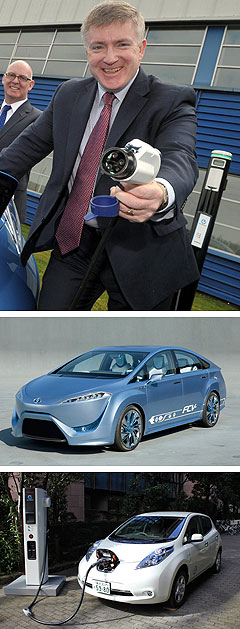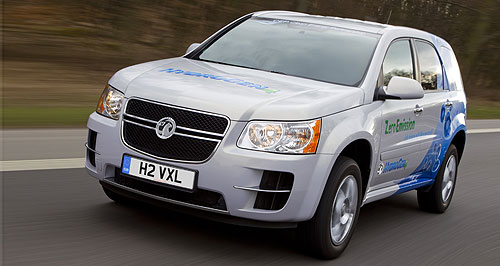Make / Model Search
News - General News - RegulationBritain backs hydrogenHydrogeneration: Vauxhall supported the UK H²Mobility launch in London with one of its HydroGen4 fuel cell prototypes, which first began field trials in Germany in 2008. UK government announces fuel cell program and extension of plug-in EV rebate scheme19 Jan 2012 BRITAIN has declared its intention to be an important player in a hydrogen future by announcing a new government-backed program to support the roll-out of fuel cell electric vehicles in 2014/15. The new program – called UK H²Mobility – was launched yesterday by UK business minister Mark Prisk, who said the government investment would amount to £400 million ($A594m). It has the support of a number of car-makers, including Vauxhall, which displayed its fourth-generation fuel cell vehicle HydroGen4 at the launch event in London. A day earlier, the British department of transport announced an extension of its Plug-In Car Grant through to the end of 2015. While Australia still offers no incentives to buyers of electric or hybrid vehicles, the British scheme not only offers plug-in car buyers 25 per cent of the purchase price – up to 5000 ($A7420) – but has added a rebate of 20 per cent (up to 8000) on a plug-in van. Mr Prisk said the “ground-breaking” UK H²Mobility program would ensure the UK is well positioned for the commercial roll-out of hydrogen fuel cell vehicles, or FCVs. “The UK is proving itself to be a key early market for ultra-low emission vehicles with growing numbers of electric and plug-in hybrids appearing on our roads,” said Mr Prisk.  Left: UK business minister Mark Prisk. Below: Toyota FCV-R Concept and Nissan Leaf EV. Left: UK business minister Mark Prisk. Below: Toyota FCV-R Concept and Nissan Leaf EV.“The Government is supporting this market by investing £400 million to support the development, demonstration and deployment of these vehicles. “Hydrogen fuel cell electric vehicles are increasingly being recognised as one of the viable options as we move to a lower carbon motoring future. They are highly efficient, can be fuelled in minutes, travel an equivalent range to a conventional combustion engine, and have zero tail-pipe emissions. “This country has a number of world-class companies that are developing exciting technologies in both the hydrogen energy and automotive value chains and it is vitally important that we identify what is required to make these cars a realistic proposition for UK consumers. “UK H²Mobility will bring together industry expertise to establish the UK as a serious global player in the manufacture and use of hydrogen fuel cell electric vehicles and the supporting infrastructure.” The group brings together the government and industrial participants from the utility, gas, infrastructure and global car manufacturing sectors, including BOC, Daimler, Hyundai, Nissan, Tata, Toyota and Vauxhall, which are among 13 signatory parties to the Memorandum of Understanding. Toyota – a founding member of the UK H²Mobility Group – announced at last year’s Tokyo motor show it will market a hydrogen vehicle by the end of 2015 that will cost around €100,000 ($A124,000). The company has been conducting field trials since 2002 in Japan and the US, and at the Tokyo show revealed the FCV-R Concept, which was described as “a vision for a practical saloon-type fuel cell vehicle that is scheduled for launch in 2015”. Toyota Motor Europe president and CEO Didier Leroy said FCVs will play an important role in realising a low-carbon society. “We plan to commercialise fuel cell vehicles in 2015 and to achieve this goal a hydrogen charging infrastructure will be required,” said Mr Leroy. “That is why we welcome the establishment of the UK H²Mobility Group to confirm the potential for hydrogen as a low-carbon fuel in the UK. “A close and positive working relationship between vehicle manufacturers, infrastructure companies and Government is of vital importance.” Nissan vice-president for vehicle design and development Jerry Hardcastle said the formation of the new group was an important step for the automotive sector towards the development of clean vehicle technologies and zero emission mobility. “It will lay many of the foundations for the commercial deployment of hydrogen-powered fuel cell electric vehicles which could represent a large segment of the UK market in the coming years,” said Mr Hardcastle. “With this comprehensive list of partners we can be assured to have all the knowledge necessary to make UKH2 Mobility an exhaustive and credible study.” While hydrogen is at the forefront of the government’s long-term thinking, the extension of subsidies for buyers of plug-in electric cars until 2015 shows the UK is covering all bases in its aim for low-carbon transport. Transport minister Norman Baker said the purpose of the consumer grant is to enable the purchase of ultra-low carbon vehicles that could otherwise have been unaffordable. He said the consumer will also benefit from lower running costs over the lifetime of the vehicle. “Electric vehicles are the arrowhead for a low-carbon revolution in motoring and as more models come to market we’ll begin to see sales gather pace,” the minister said. “Car buyers have had a year to take advantage of our grant and now it’s time for van buyers to get their chance to go electric. “This is great news for businesses given the lower running costs of these vehicles – fleet buyers tell us that this is one of the most important factors influencing their decision on what to buy. “It is radical initiatives like these which will allow us to create a transport system that both cuts carbon and is an engine for economic growth.” To the end of 2011, the government had received 892 applications for the Plug-In Car Grant. Five cars are currently eligible for the grant – the Mitsubishi i-MiEV, Peugeot iOn, Citroen C-Zero, Smart ForTwo electric drive and Nissan Leaf – while five more are expected to go on sale this year – the Tata Vista, Vauxhall Ampera, Chevrolet Volt, Toyota Prius Plug-in Hybrid and Renault Fluence ZE.  Read more |
Click to shareGeneral News articlesResearch General News Motor industry news |











Facebook Twitter Instagram